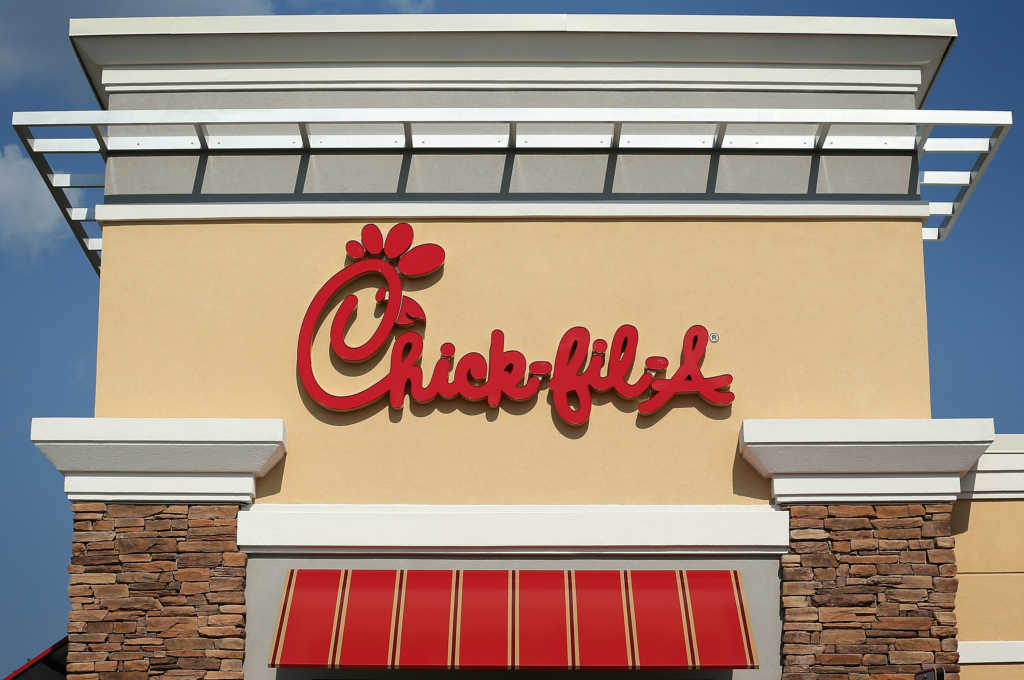These days, the leader in the fight for religious liberty in the marketplace walks on four legs and is notoriously bad at spelling.
I’m talking about Chick-fil-A. Well, I’m specifically talking about the quick service restaurant’s bovine mascot — you know, the massive cow that parades around telling us to “Eat Mor Chikin.”
In November, Rider University in Lawrence Township, New Jersey, nixed Chick-fil-A from its list of potential on-campus restaurants, citing the fast-food chain’s “record,” which the college claimed is “widely perceived to be in opposition to the LGBTQ+ community.”
University in New Jersey Won’t Have Chick-fil-A on Campus Because of the Restaurant’s ‘Record’
Rider President Gregory Dell’Omo ironically said in a statement at the time the decision to yank the country’s top fast-food eatery from the list was all about “being faithful to our values of inclusion.”
Now, several months later, Cynthia Newman, dean of the school’s college of business, is resigning her post at Rider, citing her convictions as a Christian.
Newman admitted she’s not leaving her job as dean because the college didn’t allow Chick-fil-A on campus; her concerns are much bigger than that. She told Faithwire she’s stepping down because of school administrators’ judgmental statements about Chick-fil-A’s corporate values.
She went on to explain that the university issued talking points asking faculty to tell critics the reason Chick-fil-A won’t be on campus is because the college “seeks to produce individuals that are responsible citizens.”
Chick-fil-A Is More Popular Than Starbucks Among a Very Important Demographic
“The implication [in that talking point] is that, if you have values that align with Chick-fil-A’s, you’re not a responsible citizen,” Newman said. “It was the implication in light of that first statement … that caused me to have a problem.”
She’s exactly right. It’s those preaching that view — a form of anti-Christian bigotry disguised as virtuous tolerance — who are trying to bully faith out of the marketplace. The Chick-fil-A cow has become their stalwart opposition.
Chick-fil-A is leading the way — and winning handily — in its effort to keep Christians’ seat at the table in the public square.
“There is a rather large voice that has been missing in the discourse and the dialogue that’s been happening in our country,” Newman explained. “It shouldn’t be so newsworthy that a committed Christian would stand up for their beliefs and for their values and not want to see those denigrated in any way — not elevated, but not denigrated, either.”
This battle is about much more than chicken; it’s about Americans’ rights to own successful businesses while being Christians at the same time — and not having to be quiet about either of those things.
Last spring, New Yorker writer Dan Piepenbring penned an article about Chick-fil-A’s “creepy infiltration” of New York City. Piepenbring’s big beef with the chicken favorite? It’s corporate mission “to glorify God.”
A society that prides itself on not labeling or pigeonholing any person or group of people has done just that by concocting a controversy that doesn’t exist, suggesting Chick-fil-A — which employs people and serves customers of every ethnicity, religion and orientation — is somehow unfit for the marketplace.
LOL: The New Yorker is Very Afraid of Chick-fil-A and the Christian ‘Infiltration’ Happening in NYC
“We shouldn’t judge people or label people and make assumptions about them as a whole person because of a belief system or a values system or even a lifestyle that they put forward,” Newman said.
The outgoing dean noted there’s no need “to put down one group to support and advocate for fair treatment of another group.”
What’s next for Newman?
Though Newman has resigned her post as dean of the school of business, she will return to her faculty position as a tenured professor at Rider — an opportunity for which she is very grateful.
In her role as a marketing professor, Newman told Faithwire she plans to be even more outspoken about the importance of protecting religious liberty in the marketplace.
“I will be able to continue to be an advocate — and perhaps even a stronger advocate than I would’ve been able to be in my administrative position — for a campus environment where we don’t elevate or denigrate any one group’s values, opinions or beliefs,” she said. “Where we can truly have civil dialogue and disagreement without disrespect.”



